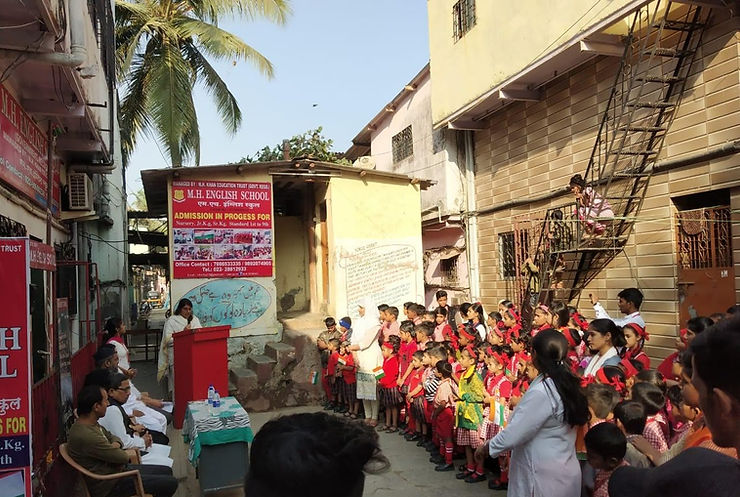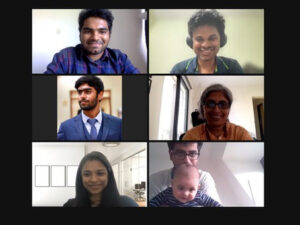What is the cost of pursuing your dreams in today’s society? Some would say it is years of persisting education, some would say it is one paycheck per month, some would say it is a cauldron full of luck. But then there would be a third kind of people who would say that the cost of dreams is responsibility.
Several organizations and NGOs like Room to Read, Pratham, Tostan, and several more around the world have worked tirelessly towards nurturing the dreams of those who either do not have the means to fulfill theirs or are in need of someone to guide them through the correct path to their destinations. From schools which take zero to minimal amounts of fees, to the governments around the globe spending millions worth of money to mass communicate the importance of education through campaigns, to the rich of the society funding and establishing schools for the poor, to children being enticed into coming to schools with the promise of a free meal every day, numerous efforts have been made to ensure that the upcoming generations have all the means to fulfill their dreams through basic education and equal opportunities. In spite of this, the number of students enrolled in the schools keeps dwindling every year along with the motivation of the teachers and the change-makers.

The causality behind this disappointing reality, however, is hardly single-dimensional. When the volunteers of Humane Warriors created the Hunger Relief Program which was designed to help vulnerable and unemployed families buy food and medicines during the pandemic, it was soon realized that the pandemic was not the only time these families and their children had to go to bed empty stomach. Having interacted with the affected families, they had given a glimpse of the harsh reality of their lives and how each day is a struggle to put food on the plates. During the Hunger Relief program, Reshma*, a mother of three, told our volunteers how there were days when the family had to go to bed having eaten just meager amounts of rice mixed with salt. Under these circumstances, it was very evident that for most of these families, having their children educated was a distant dream.
It was revealed that the lack of finance was just one dimension of the problem. The current scenario of the education system, especially in India, although academically competent, fails to ensure a livelihood based on other skills, to those who do not or cannot surpass the expected academic thresholds set by a conventional system. The only reason the people belonging to this stratum of society are inclined towards education, however reluctantly, is because somewhere they believe that a better and more secured future awaits them at the end of this long road.
However, when a child fails to perform in school or when the parents realize that the teachers of the school are not really motivated towards teaching, their last shred of hope for the system disappears. They decide that the child would be much better off learning a skill through manual jobs or helping the parents in the fields, instead of wasting the day loitering around the school. At least that way there would be an assured source of income in the future, however small.

As was discovered by our volunteers through multiple interviews that they conducted, many of these families have several members living under one roof. As such, it sometimes becomes the responsibility of the oldest child (or in many homes the daughters) to sacrifice his/her education either to take care of their younger siblings while the parents work or to ensure that their younger siblings get the basic education that they had, as the parents cannot afford the education of all their children. Neha*, a class 8 student from the rural parts of Mumbai, told one of our volunteers that as her father lost his job due to the pandemic, her brother had to give up his studies to take up a job as a CCTV camera installation technician just to sustain the family.
Despite the above concerns, many families have overcome these obstacles and facilitated their little ones to go to school with the little money they make on a daily basis. The pandemic, however, had a different story to tell. As daily wagers struggled to find work and savings dried up for the poor, the futures of students were left hanging by a thread. While most of us, with some adjustments, seamlessly shifted to the digital platforms to continue our educations and jobs, thousands were not as privileged. The drop-outs for the low-income schools housing the children of migrants, daily wage workers, etc. increased marginally. According to a recent report, the drop rate for the school, Shri Sidheshwar Vidyalaya Vitale situated in Kadadhe Colony, Pune, India, has been an astonishing 23.15% from 216 students in 2016 to 166 in 2020. This paved the way to lay the foundation of the scholarship program and the elearning programs by Humane Warriors.

Warriors in action
M.H. English school in Malwani, Mumbai with its 350 students from class 1-10, with a staff of 12 teachers and the additional contract-based staff was one of the many schools facing such a crisis, which was approached by the volunteers of Humane Warriors. The head of the school Mohsin Sir has been a pioneer in championing the cause of the students of his school with whatever little means he and his community of people could manage. These people have fought their way through lack of funds, means, and equipment to ensure that the children get a proper education. However, with the ongoing pandemic restrictions and the school closing, it was very difficult to maintain the regular routine of things. Most of the students could not afford the digital platforms required to continue the classes online. Archana’s* family had only one phone, a basic Nokia handset belonging to her father, a daily wage laborer, which was not equipped with internet facilities. Between providing food for the family during a pandemic and buying a smartphone for his daughter’s studies, the choice was very clear. Sahidul* had to go to his neighbor’s house every day to do his every day classes as his family could afford only one smartphone, which was used by his elder brother for his classes. There was also the problem that most of these families were even finding it difficult to manage a proper day’s meal, let alone afford an internet pack. Some of the students who could overcome all the aforementioned hurdles had problems keeping their motivation and interest intact on subjects through the screens of their mobile phones with limited interaction with the teachers and their fellow students. The motivation of the parents to continue their children’s education also dwindled, as they came to terms with the reality of how unstable their financial conditions were with the ongoing pandemic. The future, with their children being able to achieve something in life or them being able to provide any more than two or on good days, three meals, seemed too feeble with the current scenario.
The obstacles before Humane Warriors and people like Mohsin Sir were manifold which would require a step-by-step elimination of these hurdles and an initiative backed by extensive research and surveys to cater to the needs of those who are the most affected by the pandemic. Hence, the first step was to put food on the tables of these needy families. Ration kits were donated to 338 families for the first 15 days of the lockdown through the Hunger Relief Program. Once the situation became a bit more stable for these families, HW along with Mohsin Sir, raised funds through the scholarship campaign to support the education of 100 students from his school for two months. During this time, surveys were conducted to understand what the aspirations and expectations were of both students and parents from the educational institution and also from the volunteers wanting to bring a change.

Mentorship Program: Supporting dreams of change
The surveys showed that many students were not only interested in studies but had dreams they wanted to pursue, in spite of their circumstances. Out of three students who had been interviewed, all three had left studies due to reasons ranging from financial crisis to facilitate the education of their siblings by working. However, two of them were completing their studies through correspondence while working in a mall and as a water filter service person respectively. They dream of becoming a police officer, studying hotel management and commerce in the future, and are eager to learn but lack the resources and the directionality. Another student has seen her father tailoring all her life and hence wants to pursue fashion technology (as fashion designing might be an expensive course). The dreams of these students range from pursuing subjects in the field of Arts like photography, film making, jewelry designing, advertising, travel and tourism, journalism and mass communication, to becoming doctors, engineers, environmental scientists, bachelors in geography, defense personnel to pursuing Commerce and working as lawyers, MBA graduates, economists, accountants and so many more.
This is why the team of volunteers and people working at the grassroots level like Mohsin sir, felt the need for a mentorship program to not just motivate students to continue their studies but also to guide them in achieving their dreams by having one on one sessions with every student to give them a sense of direction to fulfill the same. The need for vocational training and skill management was also something the parents and the students felt was necessary and was extensively found in the survey reports as a priority. The team hence felt that it was also necessary to provide these students additional training in various jobs as per their preferences such that they may also assist their families with their skills by working part-time and would not have to leave their studies to do full-time jobs. What was so encouraging was to see so many people come forward and volunteer to become mentors for these underprivileged kids, some of them have had to leave their studies unwillingly to fulfill their responsibilities.

These mentors have pledged to not just guide students with their career choices but are also willing to lend an ear to all those who are going through difficult situations in their lives apart from their studies and help them in every possible way. It is also overwhelming to see that in an age when the camera comes out faster than the wallet while helping a needy, the extent to which people working at the very grassroots levels like Mohsin Sir and his community have gone, from excusing the fees of almost all the students for the academic year, to collaborating with an organization based out of India by learning how to connect digitally and being completely transparent about the funds and their utilization and helping the children of the community by connecting with each of them on a very personal level.
In the end, I would like to say that the cost of dreams for different people in society has always been different. However, there are sections in our society, whose dreams demand more than just the basics like finance and good schooling. They barter their dreams for the burden of responsibilities from an age when for most of us the only hardship in our lives was the Math homework due the next day. However little does that mean that their dreams are meant to be buried and forgotten? With some help from people like Mohsin Sir and our volunteers from Humane Warriors like Amal, Garvit, Jyotsna, Malavika, Parth, Sachin, Sharanjay, Sia, Siva, and Yash, these buried dreams can grow into full blooming trees bearing fruits for society and just like that, we may find the means to pay for the cost of the dreams for generations to come in the future.



